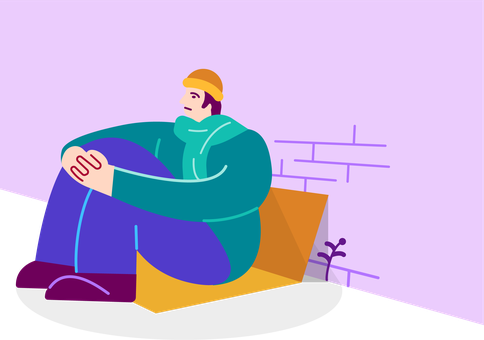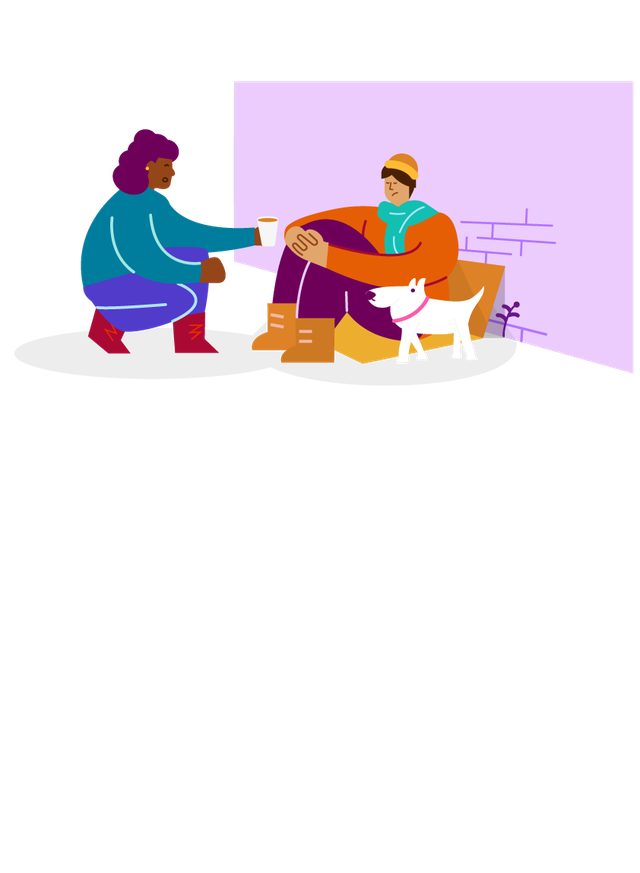Last updated: 08 May 2025
Anyone can become unwell when the weather is hot. However, people who are at higher risk of becoming seriously unwell include:
- People with underlying health conditions
- People on certain medications
- People with serious mental health needs
- People who are using drugs and alcohol
- People experiencing homelessness, including those sleeping rough and those who are unable to make adaptations to their living accommodation such as people who sofa surf or live in hostels.
People experiencing homelessness are at a heightened risk of developing heat-related illnesses due their inability to keep cool (owing to a lack of shelter) and reduced access to showers and drinking water.
Recognising heat related illnesses in people experiencing homelessness
Heat exhaustion is the body’s response to an excessive loss of water and salt (usually through excessive sweating when your body becomes very hot). Symptoms include paleness and sweating, rapid heart rate, muscle cramps, nausea and vomiting and dizziness/fainting.
What to do:
- Lie down in a cool area
- Remove outer clothing
- Use cool water or wet cloths to cool skin
- Hydrate (if fully conscious)
- Seek medical advice or call an ambulance if no improvements.
Heatstroke is a condition caused by your body over-heating, with the person’s body temperature becoming dangerously high. It can be a life-threatening emergency and untreated symptoms can include seizures, confusion, and unconsciousness.
What to do:
- Call for an ambulance immediately
- Whilst waiting for emergency help, lie in a cool, shaded area
- Remove clothing and wet skin with cool water
- Hydrate (if fully conscious)
- If unconscious, position individual on their side and clear their airway.
Tips for keeping cool in the heat
- Drink plenty of water, even if you don’t feel thirsty
- Spend as much time as possible in air-conditioned buildings e.g., libraries, day centres
- Wear a hat and light coloured, loose fitting clothing
- Apply sunscreen or seek shaded areas
- Avoid physical activity
- Avoid or limit alcohol, substances, caffeine and sugar
- Eat salty food to replace the salt lost through sweating.
Recommendations for homelessness services
- Have supplies of cool water, sunscreen, hats, sunglasses and if possible, spare loose-fitting clothing to offer
- Extend opening times in periods of extreme heat to provide shelter
- Information about available provisions should be shared with relevant organisations and displayed in places where people experiencing homelessness may go e.g., in train stations, libraries, community centres etc.
- Map out available ‘cool spaces’, water re-fill points, and toilets to be able to advise people of
- Outreach services should do additional day time shifts during periods of hot weather to hand out provisions and advise of cool spaces available.
Further resources
- The UKHSA has released a new Adverse Weather and Health Plan as well as guidance on supporting people sleeping rough before and during hot weather
- To support organisations with their hot weather communications, the UKHSA has produced a new toolkit for 2024. It provides basic health information that can be communicated during hot spells.
- The GLA has produced London Specific Heat SWEP guidance.
- Groundswell have produced a leaflet on looking after yourself in a heatwave
- The Government website hosts a range of guidance for supporting people during a heatwave.
- The Government has produced ‘Beat the heat’ guidance which outlines how to stay safe in hot weather
This webpage resource has been funded by MHCLG through the VCFS programme.

